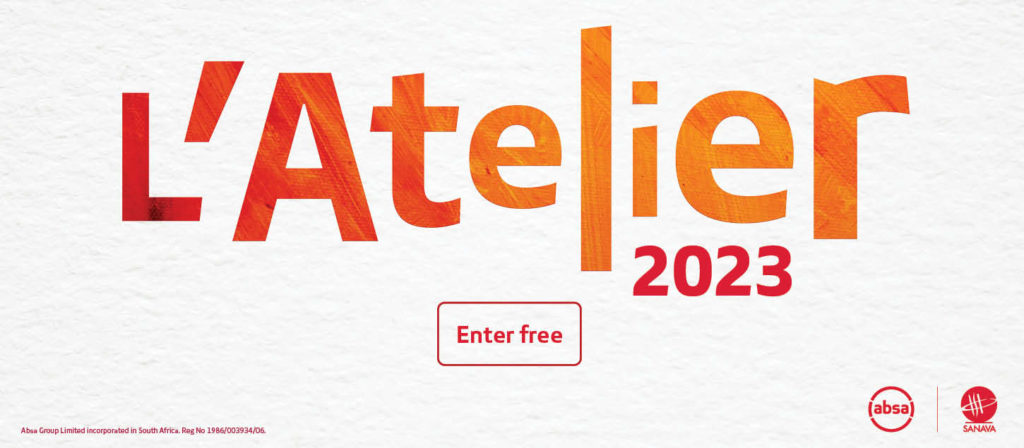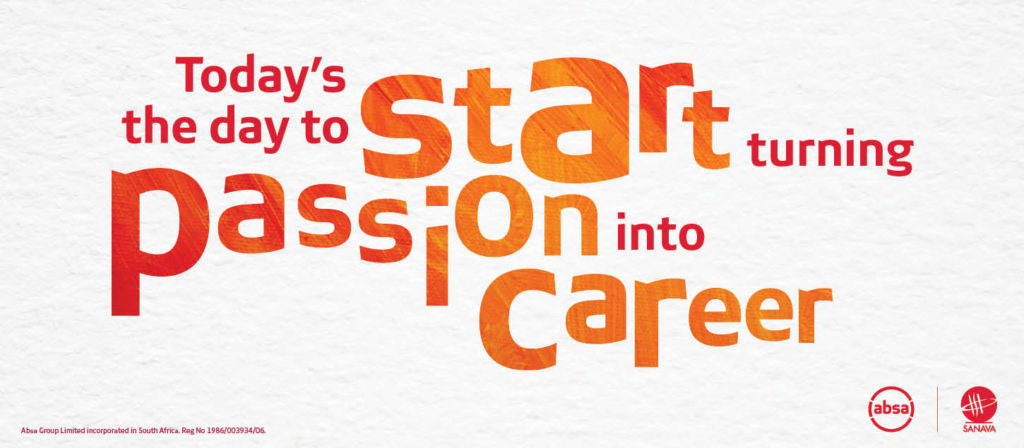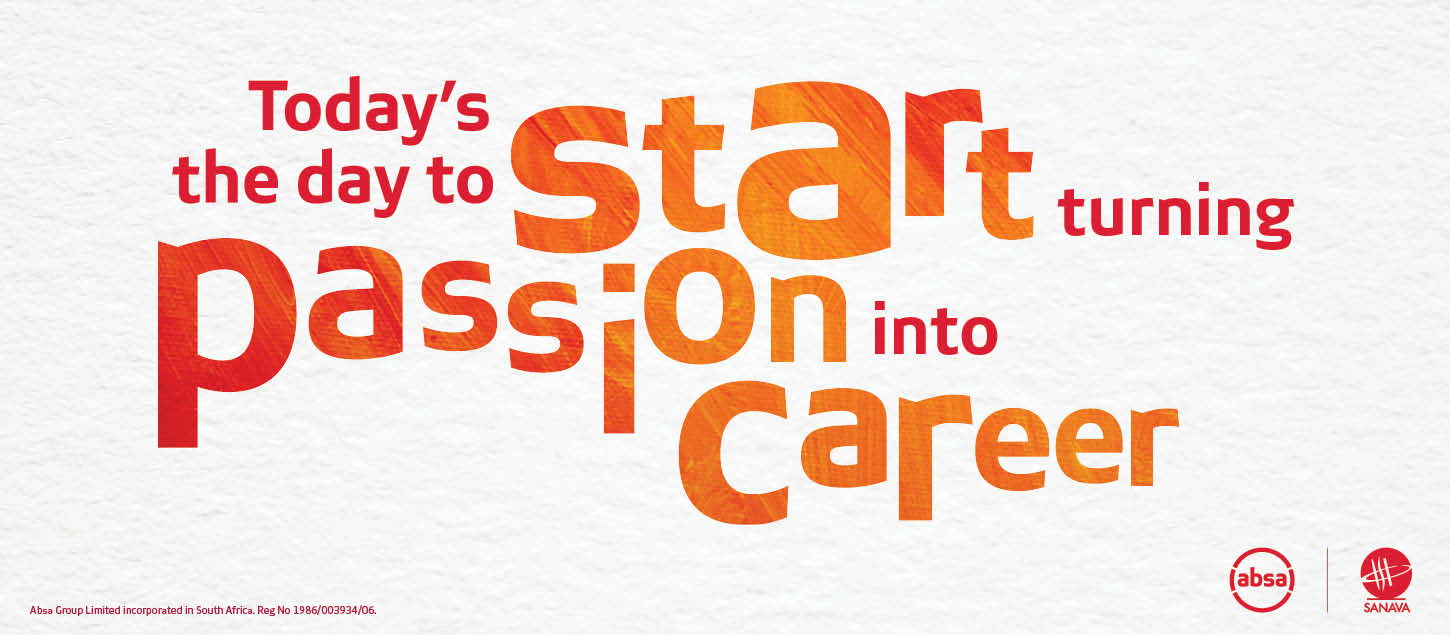Back in April entries for the annual and leading Pan-African Absa L’Atelier art competition opened up its doors across 12 countries in Africa to continue its purpose of enhancing, developing and celebrating the rich and diverse emerging talent of artists found within the African continent.

Hosted annually by Absa in partnership with the South African National Association for the Visual Arts (SANAVA), this year marks its 37th year anniversary of creating a platform that dedicates itself to the elevating, educating and equipping African artists with opportunities to collaborate, learn and expand their worlds through their gifts of art.
This competitive experience is one of the most esteemed art contests in Africa that focuses on how best to support young artists in growing & advancing their careers locally and abroad whilst offering them a platform to tell their stories. The Absa L’Atelier art competition has always aimed to empower the next generation of African artists with the tools and necessary skills to further their careers as well as showcase the creative talent found within the African continent. The prizes for the winners of each category are aimed at giving the winner the best opportunity to advance their careers though tools such as new laptops as well as networking opportunities through various masterclasses.
The competition offers four prizes, the first of which is a brand-new laptop for each winner, which will be accompanied by 10 intensive masterclasses from February to July 2024.The winners are matched with a local leading figure from their respective country in the visual arts who will mentor them for four months. Each winner will have the option of taking up a solo show in the Absa Gallery within five years of earning the prize. Last but not least, the Gerard Sekoto Award is given to a South African citizen who is permanently residing in South Africa.
To enter the Absa L’Atelier art competition all you have to do is this:
- Visit the latelier.absa.africa website and navigate to “The Competition” page that has everything you need to know.
- Create an account to enter and manage your journey by registering.
- Upload and submit your artwork(s) on your personal page after registering to be entered into Absa L’Atelier.
- Enjoy the Absa L’Atelier journey.
As 10and5, we recently sat down with Dr Paul Bayliss, Senior Specialist Art and Museum Curator of Absa, to find out a bit more about the Absa L’Atelier and how the competition has continued to educate, cultivate and elevate Africa’s art scene for over three decades.

Why has Absa and SANAVA chosen to remain committed to the development of art in Africa, whereas other initiatives have opted out over the years?
The importance of any partnership is the alignment of values and objectives and working together towards a common agreed goal. Both Absa and SANAVA have for the past 37 years worked together to identify and support young artists from across the African continent. The Absa L’Atelier is about giving these artists a platform from which they can develop and grow. But this partnership extends beyond Absa and SANAVA. For 20 years the French Embassy in South Africa, the French Institute in South Africa (IFAS) and the Alliance Française network across South Africa have partnered to support young South African artists through the Absa L’Atelier Gerard Sekoto Award, giving these South African artists an opportunity to expand their horizons with a three-month residency at the Cite Internationale Des Arts in Paris, followed by a travelling exhibition across South Africa after its official opening in the Absa Gallery.
Are there any distinctive moments, past competitive L’Atelier experiences or conquered challenges that you can recall that have helped maintain the competition’s purpose and drive?
Through the years, the Absa L’Atelier has had to evolve and adapt to a continuous changing world to ensure that it continues to make an impact on the lives of the artists that it supports. In the last decade, what was founded as a South African art competition, has grown to 12 countries across Africa, in which Absa has a presence. In addition, the Absa L’Atelier has further removed the barrier to entry for many artists wanting to participate regardless of their geographical location. As long as they have a smartphone and access to the internet, they can enter their artworks in the Absa L’Atelier. With more recent advances in technology, the adjudication, similar to the entry mechanism, is completely online, inviting leading authorities from across the globe with a knowledge of art from the African diaspora to serve as an adjudicator, while the awards event is live-streamed. Lastly, aspects of the prize, namely the masterclasses and mentoring programme, take place virtually.
The 2023 competition has been live since April. How are the submissions so far and what impressions do you get when you come across the various arts being submitted from the targeted countries?
One of the greatest blessings to be the project lead of the Absa L’Atelier has been to see the vast array of entries that are submitted year after year. By being able to first-hand explore the diversity of artworks submitted from across Africa, one appreciates the depth of skill and talent that is out there. We need to continue to uplift, support and celebrate the rich artistic talent that we have in Africa.
In your opinion, what is the significance of art in the community, especially from the perspective of being African?
Many contemporary African artists are influenced by tradition-based African art. African arts have played a central role in their communities, whether to communicate royalty, sacrality, inner virtues, aesthetic interests, genealogy or other concerns. As the art historian Robert Farris Thompson has argued for the Yoruba, African art is used to make things happen, it is efficacious and necessary for events such as rituals, masquerades and life cycle transitions to successfully occur.
Through the years, the Absa L’Atelier has had to evolve and adapt to a continuous changing world to ensure that it continues to make an impact on the lives of the artists that it supports.
– Dr Paul Bayliss (Absa Gallery curator)

One would think that a main prize filled with laptops, data and exposure, to say the least, would be more than enough to empower artists, but L’Atelier includes mentorships and masterclasses, etc. In your opinion, what values do those experiences add to the competition?
The Absa L’Atelier is about empowering the winning artists and giving them the skills to take their careers forward. Entrants include both professionally trained and self-taught artists, many of whom are highly skilled in their craft. Through the masterclasses and mentoring programme, it is about empowering these artists with the necessary personal, professional and business skills, ensuring that they are more well-rounded individuals who can take their careers forward.
Are there different categories in the competition about which people might need to know? The world of art is quite massive, especially when you think about the diversity in expressions and interpretations.
There are no themes to the artworks that can be entered into the Absa L’Atelier. Like any competition, there are restrictions, but ultimately, we would like the artists themselves to use the platform to freely express themselves in a meaningful and positive way. The world of art is quite massive, especially when it comes to diversity in expression and interpretation and, therefore, it is important that this is recognised through the diverse pool of adjudicators. As mentioned, there is a Gerard Sekoto Award, which is sponsored by the French Embassy in South Africa and the French Institute of South Africa, which is restricted to a South African artist aged 25 to 35 years.
What experiences or fundamental attributes are you hoping participants leave with after the competition?
The Absa L’Atelier is all about the empowerment of the individual winning artists. Through the mentorship and masterclasses, it is about providing these artists with the necessary business skills and acumen for them to take their careers forward. Similarly, the collaborative and solo exhibition that first opens in the Absa Gallery in downtown Johannesburg, South Africa, and then travels to the artists’ home country is about brand exposure and celebration of the artist within the country’s local visual arts ecosystem. All these initiatives – the mentoring, masterclasses and travelling exhibition – also provide unique opportunities for the artist to network and build relationships.
The Absa L’Atelier is about giving these artists a platform from which they can develop and grow. But this partnership extends beyond Absa and SANAVA…
– Dr Paul Bayliss (Absa Gallery curator)
What role do you see African art playing within global culture today and in the future?
Art has and continues to be an important and powerful force in uniting cultures from across the African continent. It has the ability to showcase Africa’s rich and diverse creativity. African artists have and continue to display various artistic styles and expressions through their work. Through this form of expression artists reflect the rich cultural heritage of Africa. Their work places African art centrally on the global stage.
How do you envision the Absa L’Atelier art competition growing in the coming decades? Any appetite to expand beyond just 12 African countries, considering that 54 exist?
The participating countries in the Absa L’Atelier are those countries across Africa where Absa has a presence. The reason for restricting the competition to these countries and not further expanding it to all 54 African countries, is that Absa has the infrastructure within each of these countries to support and implement the competition. The Absa L’Atelier is not just a competition that receives entries and then announces a winner – it is about continuing the journey with the artist after their announcement as one of the three winning Ambassadors and to continue to support them in their journey in growing their brand within the visual arts. Absa does not adopt an arm’s-length approach in supporting these artists, but is rather physically present and partnering with them on their journey. To effectively achieve this, our regional infrastructure, networks and local partnerships play an important role.




